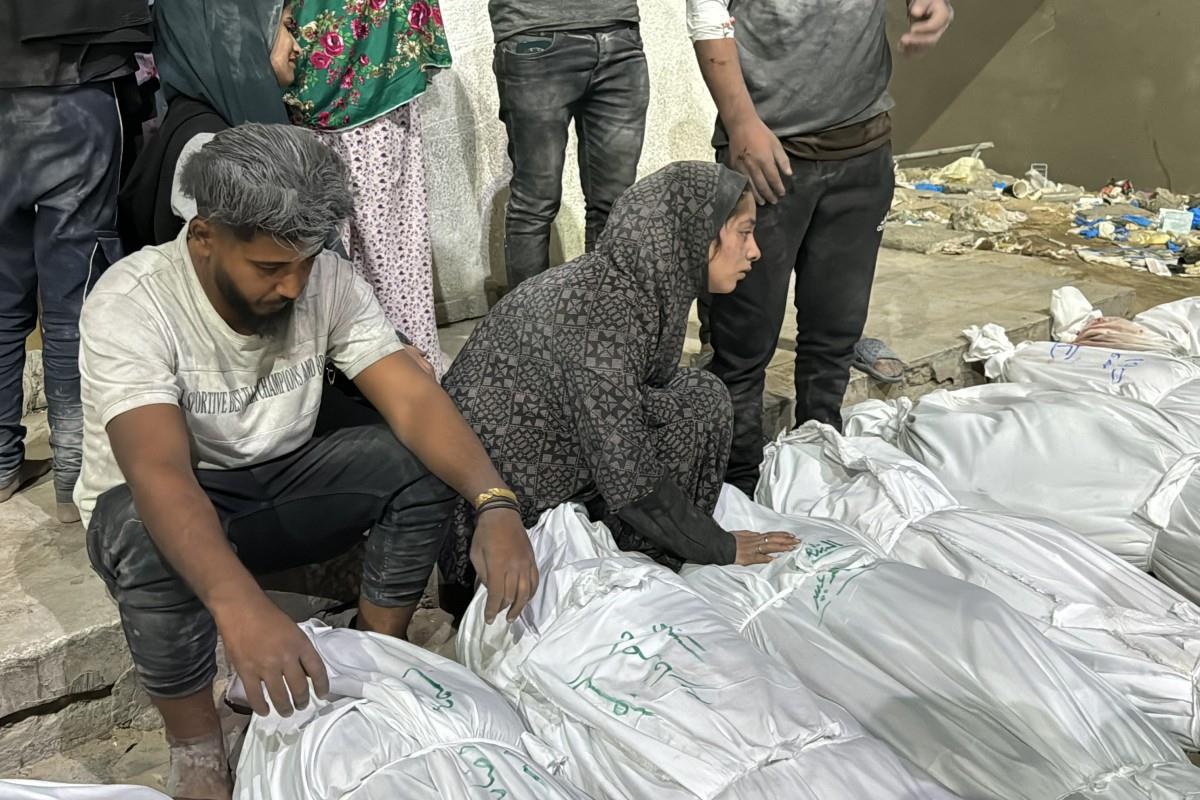
Carnage Of Israeli Air Strikes Spreads Misery In North Gaza
Beit Lahia, Gaza Strip: With their dead relatives wrapped in white burial shrouds, families in northern Gaza mourned their loved ones on Sunday killed in a massive Israeli air strike that was part of a withering, weeks-long military assault on the area.
The strike, which happened on Saturday night, flattened entire blocks of residential buildings in the town of Beit Lahia, AFP photographs showed, while rescuers said at least 73 Palestinians were massacred, with many more families still trapped under the rubble.
Families gathered at the Kamal Adwan Hospital, one of the main medical facilities in northern Gaza, where the dead were placed in rows in a scene now familiar from a year of unrelenting Israeli air strikes on the Palestinian territory.
Many of the injured, caked in dust, were treated by doctors on the hospital's floor.
Wounded Palestinians receive treatment at the Kamal Adwan Hospital after an Israeli airstrike in Beit Lahia, in the northern Gaza Strip on October 19, 2024. Photo by Islam AHMED / AFP.
For those fortunate enough to escape the bombardment, displacement has brought only more hardship.
Gazans fleeing the sweeping land and air assault have been left hungry and exhausted as they try to escape the military's dragnet, often forced to move repeatedly.
"We left with nothing but our children, walking a long distance to Gaza City. We are exhausted, with no food or water for the babies," said Mariam Hamuda, 33.
'Dying slowly'
Hamuda was among thousands who walked south all night to Gaza City to flee the Israeli ground operation targeting northern Gaza's Jabalia and surrounding areas, where the Israeli military claims it is targeting "Hamas."
"We arrived in Gaza from Beit Lahia during the bombardment. We don't know where to go or stay. There's no place for us and our families. We can't live like this. It's like dying slowly," said Ibrahim Hamuda, 66.
Displaced Palestinians, ordered by the Israeli army to leave the school in Beit Lahia where they were sheltered, rest as they arrive in Gaza City on October 19, 2024. Photo by Omar AL-QATTAA / AFP.
Israel launched the massive assault on northern Gaza on October 6, which it claimed was to prevent "Hamas militants" from regrouping, tightening its siege on the devastated area and sending tens of thousands of people fleeing.
"The nightmare in Gaza is intensifying," Tor Wennesland, UN Special Coordinator for the Middle East peace process, said in a statement on Sunday.
"Horrifying scenes are unfolding in the northern Strip amidst conflict, relentless Israeli strikes and an ever-worsening humanitarian crisis."
On Friday, the UN's top aid official talked of people trapped in north Gaza.
Palestinians inspect the damage after an Israeli airstrike the previous night in Beit Lahia, in the northern Gaza Strip on October 20, 2024. Photo by Islam AHMED / AFP.
"In Jabalia, people are trapped under the rubble and first responders are blocked from reaching them," the UN's acting humanitarian chief Joyce Msuya said on X.
"Tens of thousands of Palestinians are being forcibly displaced. Essential supplies are running out. Hospitals, overwhelmed with patients, have been hit."
The Israeli army has attempted to justify the aggression, while accusing Gaza health officials of giving exaggerated civilian casualties, including in Beit Lahia.
'Trapped'
In a recent statement the military claimed it had killed many "militants" in close battles.
Gaza's civil defence agency said on Saturday that the aggression has killed more than 400 people in just two weeks.
A Palestinian child receives treatment at the Kamal Adwan Hospital after an Israeli airstrike in Beit Lahia, in the northern Gaza Strip on October 19, 2024. Photo by Islam AHMED / AFP.
Israel has faced mounting condemnation over the civilian toll and blockade of food and aid reaching Gaza, where the UN has warned of famine.
Israel's campaign to destroy Gaza has killed 42,603 people, half of which are children, according to data from the Gazan health ministry, figures the UN considers reliable.
"We are now trapped with no food, water or medicine, facing starvation amid the rubble and destruction," said Ahmad Saleh, 36, from the Al-Tawbah area in northern Gaza.
"The situation gets worse every day and we are terrified, wondering when our turn will come."

Legal Disclaimer:
MENAFN provides the
information “as is” without warranty of any kind. We do not accept
any responsibility or liability for the accuracy, content, images,
videos, licenses, completeness, legality, or reliability of the information
contained in this article. If you have any complaints or copyright
issues related to this article, kindly contact the provider above.


















Comments
No comment